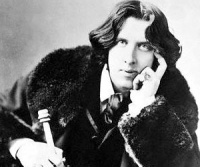Oscar Wilde
Country
Ireland
Birth - Death
1854 - 1900
Occupation
Writer
Description
Writer and poet, remembered for his plays and personal wit and flamboyant dress. Famous court case in which he fought the father of his lover, Lord Alfred (Bosie) Douglas for libel when he publicly stated that he was a homosexual and was subsequently charged with gross indecency - lost the case, was imprisoned, and eventually forced into exile.
Oscar Wilde is today one of the world’s most recognized and read writers and poets in the genre of social satire and wit.
His intellectual family upbringing, and education obtained at Trinity College in Ireland and Oxford College in England, grounded him in the classical traditions and thoughts associated with higher education of the time. His mastery of multiple languages expanded his skills beyond his borders. Wilde used this philosophical underpinning to produce novels, plays, poems, essays, and dialogues that reflect the cultural and social life of his day to great admiration. He always admitted his fondness for the Greek traditions, and it was this that fueled his homosexual preferences.
Notable works include the Picture of Dorian Gray (1890), Salome (1891), Lady Windermere’s Fan (1892), The Importance of Being Earnest (1895), An Ideal Husband (1895), and his last work The Ballad of Reading Gaol (1898).
Wilde obtained a reputation for his adoption of a decadent aesthetic once he entered the University of Oxford and settled into London society, represented by his clothing, hygiene, decor, and effeminate mannerisms. These traits would follow him for the rest of his life to the point that an aura of myth surrounded his growing reputation. He was both a Renaissance man and a Romantic, believing that the arts was the principle source of enrichment for man, as opposed to the more popular support at the time for the new sciences that were devoid of emotion and intellect. To Wilde, pleasure and beauty represented the highest ideals for man, believing in their development power. His outward appearance clearly represented this belief.
Wilde’s earnings from his publications and lectures supported him financially. His international popularity grew with each publication of poems or play, each one more sharp and satirical in its social content and prose than the former. This was particularly true of his significant number of newspaper contributions. At one point, he became editor of the magazine The Women’s World.
As he tired of journalism, Wilde moved on to conquer the stage and literary worlds. This work would increasingly include homosexual allusions and airs as he grew more confident in who he was as a person, and he took greater risks in outwardly affirming his strong personality.
However, Wilde’s decadent aesthetic and unabashed homosexuality and persona would soon lead to his personal downfall. His behaviour culminated in disaster when his affair with the dashing Alfred Douglas, son of the Marquess of Queensbury, caused a public stir with Douglas’ father. When the Marquess slighted Wilde as a sodomite in a written note, Wilde sued him for libel. After he lost a lengthy and very public trial, Wilde was convicted of sodomy and sentenced to prison for two years of hard labour. The trauma of this experience broke Wilde’s spirit and, upon release, he exiled himself to France for the last few years of his life. Wilde died penniless in 1900.
Once again, we witness a genius beaten up on loose grounds of moral indecency for his sexual preference and behaviour - in this case a genius of the literary world. This occurred at the same time his prodigious output was highly admired and was receiving the highest degree of respect and admiration. Indeed, during his high profile trial, his stage play The Importance of Being Earnest was presented to sold-out appreciative audiences, a play which satirically mocks the institution of marriage and its Victorian conventions.
The Marquess of Queensbury had intended to disrupt the opening night of the play by presenting Wilde with a bouquet of rotten vegetables. Wilde was tipped off about the stunt and Queensbury was refused admission to the theatre. After early success, the play was forced to close at the conclusion of Wilde’s trial.
How does one reconcile the opposition to a lifestyle in the real world to that which is acceptable and embraced when portrayed, though perhaps in a satirical and sly way, on the stage? Is this a case of pure hypocrisy? Both were carried out in the public realm – in the former case, that of the courts and the public press, while the latter was in the confines of the theatre.
Oscar Wilde’s contribution to the social satire and wit of his Victorian age has been subsequently accepted with great admiration. His writings and plays endured the scandal of his time and are seen as a classic case of life imitating art.

